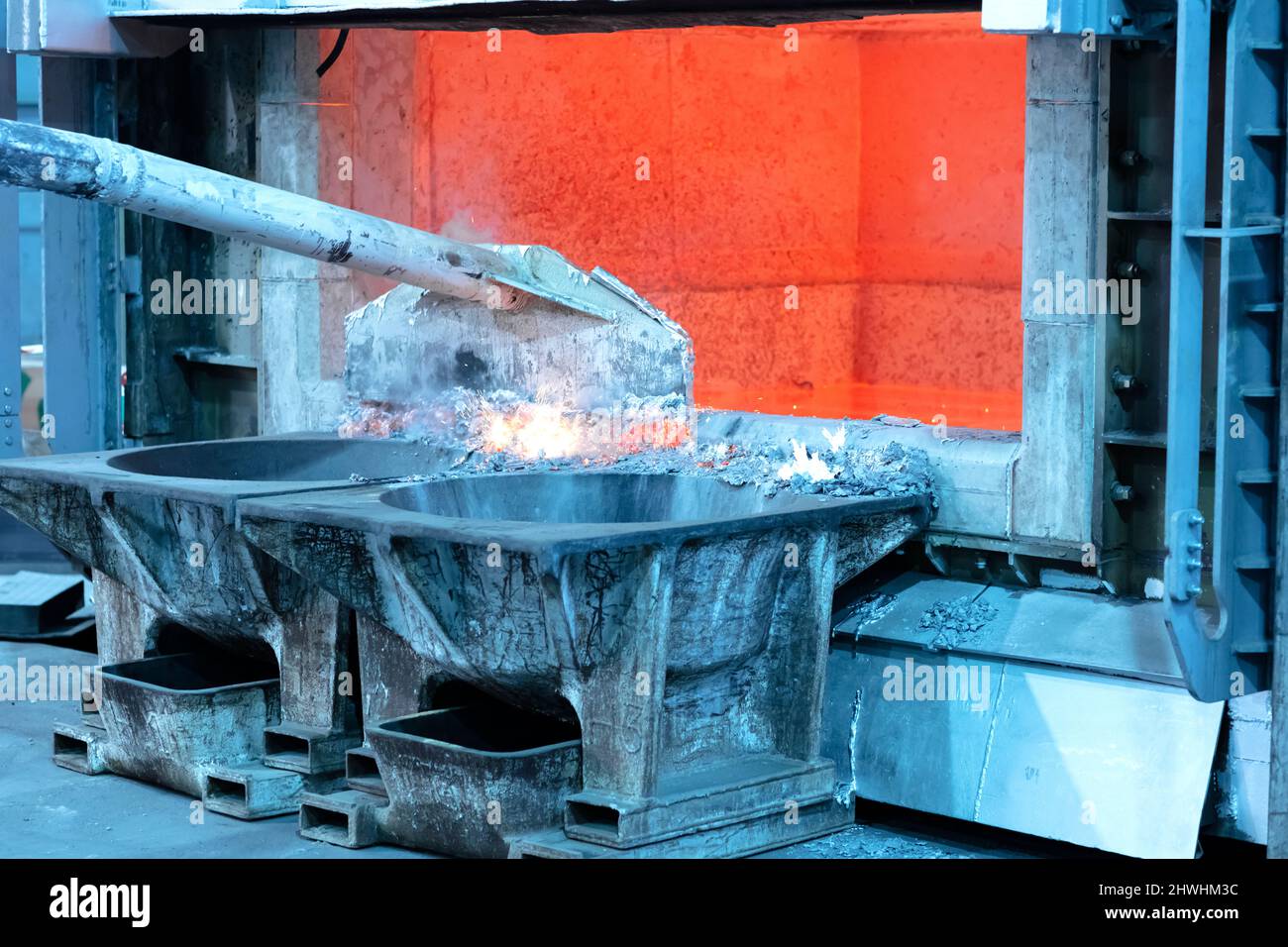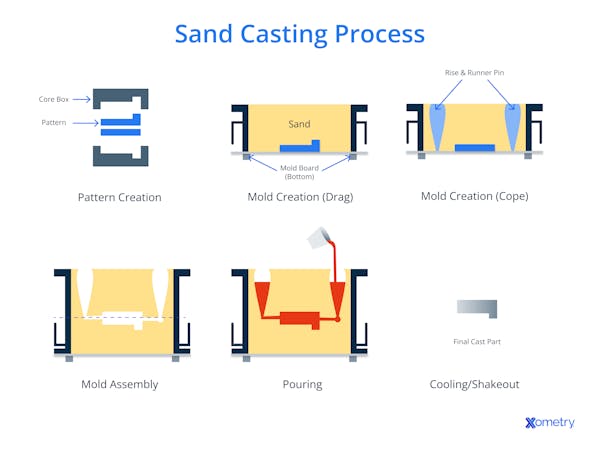Recognizing the Benefits and Innovations in the Aluminum Foundry Market
The Aluminum Foundry market plays a crucial role in contemporary manufacturing. Its lightweight properties notably improve gas effectiveness, specifically in aerospace and automotive industries. Furthermore, Aluminum's resistance to rust assurances durability in numerous applications. As the sector progresses, technologies such as advanced recycling and additive manufacturing are improving manufacturing approaches. Exploring these advancements exposes not only the benefits but additionally the obstacles ahead for Aluminum factories in a quickly altering market.
The Lightweight Advantage of Aluminum
Aluminum's lightweight nature offers significant benefits throughout numerous markets, especially in manufacturing and transport. Its reduced density permits the manufacturing of parts that are less complicated to install and handle, causing minimized labor costs and enhanced performance. In the vehicle industry, lighter vehicles add to improved gas economic situation and lower emissions, straightening with worldwide sustainability goals. Similarly, in aerospace, using Aluminum reduces the overall weight of airplane, which is essential for boosting efficiency and minimizing operational prices.
Furthermore, Aluminum's lightweight residential or commercial properties assist in innovative designs that were formerly impractical with much heavier products. This flexibility allows manufacturers to produce intricate shapes and frameworks while maintaining structural honesty. Overall, the light-weight benefit of Aluminum not only boosts item performance yet also drives innovations in technology and layout, making it a preferred product in different applications.
Deterioration Resistance and Resilience
The Aluminum Foundry sector is renowned for generating materials with exceptional deterioration resistance, making them ideal for different applications. This residential or commercial property, integrated with boosted architectural integrity, adds to the resilient efficiency advantages that Aluminum parts offer. As a result, sectors significantly rely on Aluminum to satisfy demanding ecological conditions without compromising high quality.
Superior Rust Resistance
While different metals deal with considerable difficulties from environmental aspects, Aluminum sticks out for its superior corrosion resistance, making it a favored choice in numerous applications. This residential property is largely due to a natural oxide layer that forms on the Aluminum surface area, giving an obstacle against dampness and destructive agents. Unlike other steels that might rust or degrade gradually, Aluminum preserves its stability even in harsh environments, such as seaside locations or industrial setups. Additionally, its lightweight nature incorporated with rust resistance makes it excellent for applications in aerospace, vehicle, and marine sectors. Generally, Aluminum's exceptional durability not just improves item durability but additionally decreases maintenance expenses, presenting an engaging advantage for manufacturers and customers alike.
Improved Architectural Stability
Designers and engineers significantly acknowledge the relevance of improved architectural stability in modern-day applications, where both rust resistance and sturdiness are crucial. Aluminum alloys, known for their light-weight residential or commercial properties, likewise exhibit exceptional resistance to rust, making them ideal for severe settings. The innovative methods used in the Aluminum Foundry industry contribute substantially to producing elements with boosted longevity. Advanced casting processes and alloy structures are customized to meet certain efficiency requirements, making sure that frameworks can endure severe problems without endangering integrity. Surface treatments and finishings boost the life-span of Aluminum items, even more alleviating damage over time. This focus on improved architectural honesty not only extends the usability of materials however additionally lowers upkeep prices, strengthening Aluminum's placement as a product of selection in numerous markets.
Durable Efficiency Perks
Resilient efficiency in Aluminum elements is mainly credited to their premium corrosion resistance and sturdiness. Unlike lots of metals, Aluminum naturally creates a safety oxide layer, which stops rust and damage in various settings, consisting of marine and industrial settings. This inherent residential or commercial property considerably expands the life-span of Aluminum products, minimizing upkeep and replacement prices. In enhancement, the lightweight nature of Aluminum enhances its applicability throughout markets without jeopardizing strength. The product's resistance to deterioration also adds to its dependability in requiring applications, making it an ideal selection for vehicle, aerospace, and construction fields. As markets increasingly focus on sustainability and durability, Aluminum's performance advantages align with modern design requirements, solidifying its duty in ingenious production processes.
Ecological Impact and Sustainability
 As the Aluminum Foundry sector advances, it increasingly focuses on ecological influence and sustainability, recognizing the requirement for liable practices when faced with environment adjustment. Initiatives to reduce waste and power consumption are at the leading edge, with lots of shops adopting recycling efforts to redeem Aluminum scrap. This not just reduces basic material use yet additionally notably lowers energy expenditure, as recycled Aluminum needs just a portion of the power contrasted to key manufacturing.
As the Aluminum Foundry sector advances, it increasingly focuses on ecological influence and sustainability, recognizing the requirement for liable practices when faced with environment adjustment. Initiatives to reduce waste and power consumption are at the leading edge, with lots of shops adopting recycling efforts to redeem Aluminum scrap. This not just reduces basic material use yet additionally notably lowers energy expenditure, as recycled Aluminum needs just a portion of the power contrasted to key manufacturing.Furthermore, improvements in exhausts regulate technologies are being implemented to reduce air contaminants, lining up procedures with more stringent environmental policies. Factories are additionally discovering alternate power sources, such as solar and wind, to power their facilities sustainably. By fostering cooperation with stakeholders, the sector intends to develop ingenious solutions that boost eco-friendly stewardship. Collectively, these efforts highlight a dedication to reducing the Aluminum Foundry's carbon footprint while promoting published here a round economy within the production market.
Advanced Manufacturing Techniques
 Reinventing production procedures, the Aluminum Foundry market is increasingly incorporating advanced production methods to boost effectiveness and precision. Techniques such as computer system numerical control (CNC) machining and additive manufacturing have actually become important parts in optimizing manufacturing workflows. CNC machining permits high-precision component construction, greatly minimizing material waste and production time. On the other hand, additive production opens new methods for complicated geometries and light-weight styles that were formerly difficult to accomplish.
Reinventing production procedures, the Aluminum Foundry market is increasingly incorporating advanced production methods to boost effectiveness and precision. Techniques such as computer system numerical control (CNC) machining and additive manufacturing have actually become important parts in optimizing manufacturing workflows. CNC machining permits high-precision component construction, greatly minimizing material waste and production time. On the other hand, additive production opens new methods for complicated geometries and light-weight styles that were formerly difficult to accomplish.Additionally, the deployment of automation and robotics in Aluminum shops simplifies operations, decreases human error, and enhances employee safety. These innovations promote a more responsive production atmosphere, making it possible for manufacturers to adapt swiftly to market needs. The assimilation of advanced simulation software application additionally boosts the layout and screening stages, causing superior product quality. Collectively, these strategies not just improve operational efficiency however additionally foster innovation, positioning the Aluminum Foundry market at the leading edge of modern-day production.
Developments in Recycling Procedures
The Aluminum Foundry sector is not only advancing in manufacturing strategies but is additionally making significant strides in recycling procedures. Advancements are arising to improve the performance of recycling techniques, minimizing energy usage and boosting sustainability. Advanced sorting technologies, such as automated optical sorting, enable the identification and separation of Aluminum from various other products with high precision. This leads to a better of recycled Aluminum, which is crucial for preserving the integrity of the end products.
Furthermore, closed-loop recycling systems are being implemented, permitting makers to reuse Aluminum scrap within their very own production procedures. This decreases waste and promotes a round economic situation. Additionally, study into new recycling methods, such as hydrometallurgical processes, uses the potential for recouping Aluminum from complicated waste streams. These innovations not only add to decreasing the carbon impact of the Aluminum Foundry market yet also boost its economic feasibility in an increasingly eco conscious market.
Applications Throughout Various Industries
Many sectors are increasingly acknowledging the versatility and benefits of Aluminum Foundry items, resulting in prevalent applications throughout industries such as auto, customer, building and construction, and aerospace goods. In the vehicle market, Aluminum castings add to lightweight automobile layouts, boosting gas performance and efficiency. Aerospace suppliers utilize Aluminum elements for their strength-to-weight ratio, crucial for airplane frameworks and parts.
In building and construction, Aluminum is preferred for its toughness and resistance to deterioration, making it excellent for home window structures, roof covering, and architectural assistances. Customer items additionally gain from Aluminum Foundry items, as seen in kitchenware, electronics, and product packaging, where light-weight and recyclable products are essential.
The versatility of Aluminum Foundry methods enables elaborate layouts and accurate specifications, catering to the varied needs of these sectors. Therefore, Aluminum Foundry items are coming to be integral to modern production procedures throughout various sectors.
Future Fads in Aluminum Foundries
As sectors proceed to develop, Aluminum foundries are positioned to accept a click for more number of key fads that assure to improve efficiency and sustainability. One prominent fad is the enhancing adoption of electronic innovations, including automation and expert system, which enhance procedures and boost top quality control. In enhancement, the push in the direction of sustainable techniques is leading factories to buy recycling technologies, significantly lowering waste and power consumption.
 Another arising fad is using innovative alloys and products, catering to the growing need for sturdy and lightweight elements throughout numerous sectors (Aluminum Foundry). The combination of additive production strategies is anticipated to transform part style, supplying customization and reducing lead times.
Another arising fad is using innovative alloys and products, catering to the growing need for sturdy and lightweight elements throughout numerous sectors (Aluminum Foundry). The combination of additive production strategies is anticipated to transform part style, supplying customization and reducing lead times.Partnership with research study establishments is additionally expected to drive development, as factories look for to establish brand-new procedures and materials. Aluminum Foundry. Jointly, these patterns suggest a transformative future for the Aluminum Foundry sector, lining up with broader objectives of sustainability and effectiveness
Frequently Asked Inquiries
What Are the Normal Prices Connected With Aluminum Foundry Production?
The typical costs related to Aluminum Foundry production include raw products, labor, power, devices maintenance, and overhead costs. These elements collectively influence the total economic investment needed for reliable Aluminum spreading operations.
How Does Aluminum Compare to Other Metals in Strength?
Aluminum, while lighter than many steels, shows impressive strength-to-weight proportions. Contrasted to steel, Aluminum is much less strong but supplies excellent corrosion resistance, making it a beneficial choice in applications where weight and sturdiness are vital.
What Precaution Are in Area in Aluminum Foundries?
Precaution in Aluminum factories usually include necessary individual safety equipment, ventilation systems to manage fumes, routine tools maintenance, training programs for employees, and adherence to rigorous safety laws to lessen risks related to molten steel handling.
How Is Top Quality Control Managed in Aluminum Spreading Processes?
Quality control in Aluminum spreading processes entails rigorous examinations at different stages, consisting of resources examination, process tracking, and final product screening. Techniques such as analytical process control and non-destructive screening guarantee adherence to sector requirements.
What Certifications Are Very Important for Aluminum Foundry Providers?
The value of accreditations for Aluminum Foundry vendors includes ISO 9001 for top quality administration, ISO 14001 for ecological management, and industry-specific requirements like ASTM and SAE, making certain compliance, security, and integrity in producing procedures.
The Aluminum Foundry industry plays a crucial role in contemporary production. The Aluminum Foundry sector is renowned for find more information producing materials with remarkable deterioration resistance, making them perfect for different applications. Changing production processes, the Aluminum Foundry industry is progressively incorporating advanced manufacturing strategies to boost efficiency and accuracy. The Aluminum Foundry sector is not just advancing in producing strategies but is likewise making substantial strides in recycling processes. As sectors continue to develop, Aluminum shops are positioned to accept numerous essential fads that guarantee to boost effectiveness and sustainability.